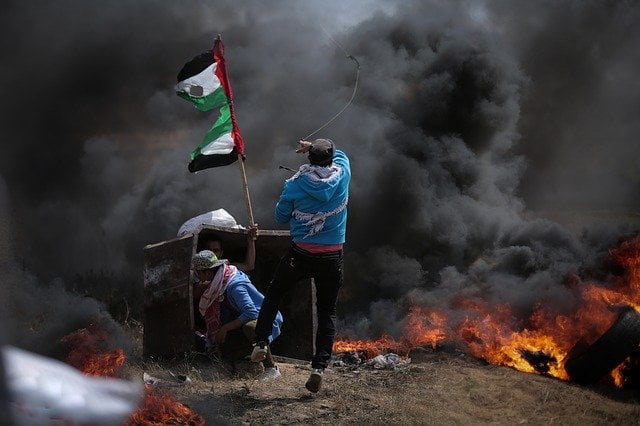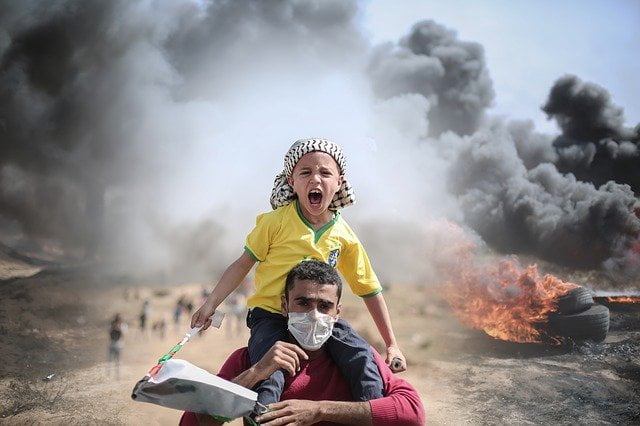The main idea behind creating Taboo Talks a public website is to let people feel free to share their experiences, ideas, views or content on topics they consider taboo.
Israel history and recent Israel Palestine conflict
The world has witnessed many conflicts and wars since human beings started weaponizing and trying to gain more nations and lands. But the Middle East has seen and is still being in a state of war. Israel and Palestine’s conflicts are one of them. I will try covering the whole, but before going towards the battle, we need to understand the History of Israel and its relation with its Neighbors. We will try to understand how the Three main Religion groups have a significant role in this conflict. I Don’t want to create any misunderstanding and hate between any Religion groups. We will start with The History of Israel then conclude with recent events.

Israel, known as the State of Israel, is a country in Western Asia. It is situated on the south-eastern shore of the Mediterranean Sea and the northern shore of the Red Sea. It shares borders with Lebanon to the north, Syria to the northeast, Jordan on the east, the Palestinian territories of the West Bank and the Gaza Strip to the east and west, respectively, and Egypt to the southwest. Tel Aviv is the economic and technological centre of the country, and its capital is Jerusalem.
Early History of Israel
David Dynasty
Around 1000 B.C., King David (David is described in the Hebrew Bible as king of the United Monarchy of Israel and Judah, ruled the Jewish people). His son Solomon built the First Holy Temple in Jerusalem, which became the central place of worship for Jews.

The kingdom fell apart around 931 B.C., and the Jewish people split into two groups: Israel in the North and Judah in the South.
Babylonian period:
- Sometime around 587 B.C., the Babylonians(Modern-day Iran) destroyed the first temple and sent many Jews into exile.
- A Second Temple was built in about 516 B.C. But was eventually destroyed by the Romans in 70 A.D.
- The Destruction of the Second Temple was significant because Jewish people no longer had a primary place to gather, so they focused on worshipping in local synagogues.
- The Babylonian conquest entailed not just the destruction of Jerusalem and its temple but also the liquidation of the entire infrastructure that had sustained Judah for centuries.
- The fall of the city and the end of Davidic kingship forced the leaders of the exile community – kings, priests, scribes, and prophets – to reformulate the concepts of community, faith, and politics.
Persian Period:
- Babylon fell to the Persian Cyrus the Great in 539 BCE, Judah became an administrative division within the Persian empire.
- The Persian era, especially the period between 538 and 400 BCE, laid the foundations for the unified Judaic religion.
- Afterwards, Persia fell to Alexander the Great, ushering in the Hellenistic period in the Levant.
Hellenistic period (C.332 – 110 BCE):

- The beginning of the Hellenistic Period is marked by the conquest of Alexander the Great (333 BCE).
- When Alexander died in 323, he had no heirs who could take his place as ruler of his empire, so his generals divided the empire among themselves.
Roman Rule in the Land of Israel (63 BCE – 324 CE):
- After the Hellenistic Periods, Roman ruled the Land of Israel.
- The Roman general Pompey in his eastern campaign established Roman Syria in 64 BCE and conquered Jerusalem shortly after, in 63 BCE.
- Julius Caesar conquered Alexandria c. 47 BCE and defeated Pompey in 45 BCE.
- Under Julius Caesar, Judaism was officially recognized as a legal religion, a policy followed by the first Roman emperor, Augustus.
- Then the crucifixion of Jesus was supported by Jews.
- Jewish–Roman tensions resulted in several Jewish–Roman wars, 66–135 CE, which resulted in the destruction of Jerusalem and the Second Temple.
- Under Roman Rule, many Jews were persecuted.
- Before, Roman Empire, Judah was an independent kingdom.
Byzantine Period (324 – 638 CE):
- Roman Empire was split into two empires, Roman and Byzantine. Due to numerous protests and attacks by the tribals in the roman empire. It ultimately collapsed, and only Byzantine Empire was left.
- Under Byzantine Periods, Christianity was the official religion, which was opposed by the jews, which turned into more persecution of jews.
- Jews enjoyed the right to practice their faith under the Rule of the Byzantines, as long as they paid the FiscusJudaicus (Tax on jews).
- In 404, Jews were excluded from specific governmental posts.
Islamic Period (638-1099):

- During the Ottoman rule, Palestine had a large Muslim majority and minority communities, mainly Christians and Jews.
- In 638 CE, the Islamic Caliphate (Title of Islam ruler extended its empire to Jerusalem). With the Arab conquest of the region, Jews were allowed back into the city.
- The Temple Mount (The Second temple), the entire complex into the Haram al-Shari.
- During this era, the Jews were flourished and were protected under Islamic Rule.
- Jewish Golden age of early Muslim Spain ( 711 – 1031).
Crusaders periods ( 1095 – 1260):

- The Crusades were a series of religious wars initiated, supported, and directed by the catholic church in the medieval period.
- The term refers primarily to the Eastern Mediterranean campaigns between 1095 and 1271 that had the objective of conquering the HolyLand from Islamic Rule.
- Jews who were opposing Jesus Christ and didn’t convert into Christianity were persecuted.
- Those who were involved in the Cruxification of Jesus christ were crucified and were forcefully converted into Christianity.
Mamluk Period (1260 – 1517):
- With the fall of the Ayyubid dynasty in Egypt, the Mamluk period began and lasted until the Ottoman conquest in 1517 CE.
- During this period, Jerusalem did not play an important role in the politics of the empire because of its location far away from the system of main roads.
- Nevertheless, the city fulfilled an essential function from a religious standpoint, and the character of Jerusalem changed from that of a cosmopolitan city to that of a Muslim holy town.
- This was finally under Ottoman Empire(Which stayed till world war 1).
Israeli-Palestinian conflict:

- The Israeli-Palestinian conflict began in the late 19th century when anti-Semitism and Jingoism spread in Russia, and Europe caused the Zionist Movement and Jews started to Emigrate to Palestine.
- Anti-Semitism, hostility toward or discrimination against Jews as a religious or racial group. In 1881 – 1884 Russia started an anti-jewish program and targeted riots.
- During 1890 – 1914 Due to Anti Semitism towards Jews living in different nations, Like Poland, UK, France, Russia, etc. They started migrating again towards the USA.
- In the 20th century, Hitler had killed more than 80 lakhs of Jews in gas chambers.
- Britishers under the Balfour Declaration promised Palestine for “Jewish homeland” but got opposed in 1919 by the Palestinian population.
- The Great Arab Revolt of Palestine, In 1936, Palestine did a massive revolt against Britishers which got crushed by the Britishers till 1939.

- After that, the First Zionist Congress was started by Theodor Herzl for the re-establishment of jews. Basel (Basle), Switzerland, held these confess from August 29 to August 31, 1897.
- The Israeli-Palestinian conflict began in the late 19th century when anti-Semitism and Jingoism spread in Russia, and Europe caused the Zionist Movement and Jews started to Emigrate to Palestine.
- Now, world war one was started from 1914-1918, Ottoman empire and Germany were together, and at that time, the British promised they would provide whatever they required once the war was finished in exchange for an alliance.
- In 1916, Britsh and France Signed a secret agreement known as The Sykes-Picot Agreement. This to define their mutually agreed and control in an eventual partition of the Ottoman Empire.
- The agreement effectively divided the Ottoman provinces outside the Arabian Peninsula into British and French control and influence areas.
- The British- and French-controlled countries were divided by the Sykes-Picot line. The agreement allocated to the U.K. control of today’s southern Israel and Palestine, Jordan, and southern Iraq.
- France was to control south-eastern Turkey, northern Iraq, Syria, and Lebanon.
- Israel started a settlement in Palestine’s region.
- In 1947, United Nations Resolution 181, a resolution passed by the United Nations (U.N.) General Assembly called for the partition of Palestine into Arab and Jewish states, with the city of Jerusalem as a separate entity to be governed by the U.N. Under this Resolution, The west bank and East Jerusalem become a part of Jordan and The Gaza Strip to Egypt.
- Finally, Israel came into existence on May 14 1948, But with this, an 8-month war started between Arab states and Israel, which is called the 1st Arab-Israel war. This war caused 760.000 Palestinians to emigrate to the west bank, Gaza, and Neighbouring Arab Countries.

- Due to the Palestinian and Israeli conflict in 1964, The Palestine Liberation Organisation (PLO) was established.
- In 1967, in The Six-Day war, Israel captured East Jerusalem, the west bank, Gaza Strip, and Golan Heights by defeating Egypt, Jordan and, Syria.
- Again in 1973, Arab states attacked Israel, but Israel successfully countered it.
- In 1982, Israel attacked Lebanon to counter Palestinian’s Militants.
- From 1987 – 1993, the Palestinian revolt, The first Intifada, happened when Israel and PLO had a secret negotiation but failed.
- Yasser Arafat, The Leader of PLO in 1994, started Self-rule established in Jericho.
- President Ariel Sharon’s visit to Al-Aqsa Mosque gave birth to the 2nd Intifada.
- After the 2nd Intifada started, new clashes and caused many suicide bombings, to counter these suicide bombings, Israel invaded the west bank in 2002.
- After the death of Yasser Arafat, a moderate leader Mohamad Abbas in January 2005, took the authority and became The President of the state of Palestine and Palestine National Authority. He had become the chairman of PLO since November 11 2004.
- After this, Israel’s forces who were in The Gaza Strip left it after 38 years.
- In 2007 Hamas took charge of The Gaza strip from Abbas’s Fatah faction.
- To counter this, Israel again started operations in The Gaza Strip. In 2017 Hamas and Fatah signed a reconciliation accord. Hamas would provide complete civilian control of The Gaza Strip to Fatah. This process is still ongoing.
Israeli-Palestinian conflict 2021 and current situation

- The Current Crisis is at Temple Mount and Sheikh Jarrah in East Jerusalem.
- After 1948, the First Arab-Israel war, Israel captured western Jerusalem, and the eastern part went to Jordan but in 1967 in Israel captured Eastern Jerusalem.
- In Eastern Jerusalem, the Al-Aqsa mosque is located.
- Significance of the Temple Mount, The temple mount or Haram al-Shari is a Holy compound that has The Al-Aqsa Mosque, Dome of the Rock, and Holy wall is located. As we all know, temple mount has significance for Jews because it is the first Temple in Hebrew Bible build by King Soloman in 950 BC. For Islam, Jerusalem was the last place on earth visited by Prophet Mohammad in 632 AD. Al-Aqsa Mosque is 3rd Holiest mosque in Islam after Mecca and Medina.
- After the 1967 Ocuppancy of East Jerusalem, religious control of this site will belong to Muslims, and overall sovereignty will belong to Israel. Only Muslims can pray in the Mosque area; Jews can pray only till The Holy wall and can only visit the site.
- This decision hurt both Muslims and Jews. Conservative groups and Muslims Believe that Israeli annexation of Jerusalem is Illegal. On the other hand, far-right Jewish Group leaders want to get Permission to offer prayers in temple Mount.

- Israeli forces generally try that massive gathering should not happen at Al-Aqsa Mosque.
- Also, after the capture of East Jerusalem in 1967, Israel settled more than 2 lakh Jews, but Palestinian families got only conditional residency permits. These Palestinian families came in 1948 in large-scale eviction and settled in Sheikh Jarrah.
In 1967, after the Israeli occupation, Israeli authorities started to send an eviction notice to families claiming it was Jews who Purchased land During Jews Emigration in
- 1885.
- In starting of 2021 central court of East Jerusalem uphold the eviction order.
- Ongoing Clashes began on May 6 2021, between Palestinian protesters and Israeli police over a planned Israeli Supreme court decision regarding evictions of Palestinians in Sheikh Jarrah, East Jerusalem.
- The Supreme Court of Israel was expected to deliver a ruling on whether to uphold the eviction of six Palestinian families from the Sheikh Jarrah neighbourhood of East Jerusalem on May 10 2021.
- Claims to Sheikh Jarrah have been a contentious issue for centuries. Two Jewish trusts bought a section of Sheikh Jarrah from Arab landowners in 1876.
- During the 1948 Arab-Israeli War, Jordan captured the area. With the support of the United Nations, Jordan built 28 homes for Palestinian refugees who had fled from the newly formed State of Israel.
- During the Six-Day War in 1967, the area was recaptured by Israel, and ownership of the homes was returned to the Jewish trusts. The Jewish trusts sold the houses to a right-wing settler organization, who have since made repeated attempts to evict the Palestinian residents.
- Under Israeli law, Israelis have the right to reclaim properties in East Jerusalem owned by Jews before the 1948 Arab-Israeli War. Still, no similar law exists that would allow Palestinians to claim their lost property inside Israel.
- On May 7 2021, massive clashes erupted at the AL-Aqsa Mosque compound in which hundreds of Palestine and Police got injured.
- Israel continues to bomb The Gaza Strip, which caused the death of nine Palestinian Children.

- On May 9, Jerusalem Day, again, violence emerged as Israel celebrates this day.
- Response to this Hamas A terrorist organization fired 200+ rockets from The Gaza Strip.
- In response to this, Israel Airstrikes, The Gaza Strip and Israel forces claim they have killed 15 Hamas terrorists and Struck down 130 Hamas and Islamic Jihad terror targets. Hamas Claims this Strike has cause The death of 9 Children and 22 Civilians.
- Israel has Imloyed Iron dome to save their Civilians from Rockets fired upon Israel.
- Israeli air raided demolishes The Gaza Building Al Jazeera, although they had given a warning before and told them to evacuate the building. International groups have very criticized this act.
Conclusion of Isreal and Palestine conflict

We need to understand that this conflict is a decade of anger and has burst out as war between Israel and Palestine and Groups like Hamas. Israel has been criticized by many organizations, Muslim nations, the Arab nations, By their Neighbor Jordan. Syria is has attacked Israel. This war is going nowhere and causing Innocent lives of communities living there. The world is right now divided into two groups Pro- Palestinians and Pro- Israelis.
India’s stance is Neutral, but we all are also seeing much violence emerging in our nation due to this division. Israel is an excellent friend of our country; during this Covid crisis, Israel is helping India with Supplies and helping India with their Delegates fight this crisis. But at the same time Lives of Palestines do also Matters, and this conflict should stop as soon as possible. But we also see Protest in Kashmir valley related to ProPalestinians.
We Indians need to understand and see that their decades going war should not cause any problems in our nation Pro-Palestinians needs to understand any protest won’t be any good until and unless our Government step and take aside. But India has never taken it aside. India has a good relationship with The Arabs, Afghanistan, Syria, Iran, Israel, Russia, USA, U.K., E.U. almost with every nation. So taking side will cause problems with our National Interest and might cause further internal security and external security issues.
Which can happen via international dialogues and talks between Israel and Palestine’s groups. So let’s hope and pray for the best.







